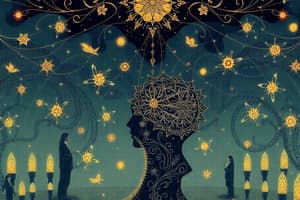Podcast
Questions and Answers
What is the branch of psychology devoted to identifying and explaining the continuities and changes that individuals display over time?
What is the branch of psychology devoted to identifying and explaining the continuities and changes that individuals display over time?
developmental psychology
Which of the following are domains of development?
Which of the following are domains of development?
- Psychosocial (correct)
- Physical (correct)
- Cultural
- Academic
Ethnicity is solely determined by biological characteristics.
Ethnicity is solely determined by biological characteristics.
False (B)
_____ psychology focuses on language development and how individuals think and speak over time.
_____ psychology focuses on language development and how individuals think and speak over time.
Match the following stages of development with the corresponding age range:
Match the following stages of development with the corresponding age range:
What is the scope of developmental psychology?
What is the scope of developmental psychology?
Which of the following are key principles in life span development?
Which of the following are key principles in life span development?
Ethnicity and race are biological constructs.
Ethnicity and race are biological constructs.
_______ refers to the societal or group beliefs, values, language, and physical products.
_______ refers to the societal or group beliefs, values, language, and physical products.
Flashcards are hidden until you start studying
Study Notes
Developmental Psychology
- A branch of psychology devoted to identifying and explaining the continuities and changes that individuals display over time.
- Also known as "Lifespan Development" or "Human Development".
Key Principles in Life Span Development
- Development occurs across one's entire life.
- Development is multi-directional and multi-dimensional.
- Development involves growth and decline.
- The role of plasticity plays in development.
- The influence of socio-cultural conditions on development.
- The interaction of age-graded, history-graded, and non-normative historical influences on development.
- The multi-disciplinary nature of human development.
Domains of Development
- Physical (Biological): physical growth, skills, and abilities.
- Cognitive: developing thinking, speech, and problem-solving abilities.
- Psychosocial: personality, relationships with others, and emotional changes.
Four Goals of Developmental Science
- Describe: documenting what is happening and how people change over time.
- Explain: determining why people develop as they do and why some people develop differently.
- Predict: predicting what people will think or feel in different situations.
- Intervene: optimizing development by applying what has been learned to help people develop in positive directions.
Stages of Development
- Prenatal Period: from conception to birth.
- Infancy and Toddlerhood: birth to age 3.
- Early Childhood: 3 to 6 years old.
- Middle Childhood: 6 to 11 years old.
- Adolescence: 11 to about 20 years old.
- Emerging and Young Adulthood: 20 to 40 years old.
- Middle Adulthood: 40 to 65 years old.
- Late Adulthood: 65 and over.
Four Contexts of Development
- Family: the basic social unit.
- Socioeconomic Status (SES): a combination of economic and social factors.
- Culture: a society's or group's total way of life, including customs, traditions, language, and physical products.
- Ethnicity and Race: social constructs used to categorize populations based on ancestry, race, religion, language, or national origins.
Influences on Development
- Heredity: internal influences, including intelligence, allergies, and DNA.
- Environment: external influences, including family, peers, and friends.
- Culture: a society's or group's total way of life, including customs, traditions, language, and physical products.
Developmental Psychology
- A branch of psychology devoted to identifying and explaining the continuities and changes that individuals display over time.
- Also known as "Lifespan Development" or "Human Development".
Key Principles in Life Span Development
- Development occurs across one's entire life.
- Development is multi-directional and multi-dimensional.
- Development involves growth and decline.
- The role of plasticity plays in development.
- The influence of socio-cultural conditions on development.
- The interaction of age-graded, history-graded, and non-normative historical influences on development.
- The multi-disciplinary nature of human development.
Domains of Development
- Physical (Biological): physical growth, skills, and abilities.
- Cognitive: developing thinking, speech, and problem-solving abilities.
- Psychosocial: personality, relationships with others, and emotional changes.
Four Goals of Developmental Science
- Describe: documenting what is happening and how people change over time.
- Explain: determining why people develop as they do and why some people develop differently.
- Predict: predicting what people will think or feel in different situations.
- Intervene: optimizing development by applying what has been learned to help people develop in positive directions.
Stages of Development
- Prenatal Period: from conception to birth.
- Infancy and Toddlerhood: birth to age 3.
- Early Childhood: 3 to 6 years old.
- Middle Childhood: 6 to 11 years old.
- Adolescence: 11 to about 20 years old.
- Emerging and Young Adulthood: 20 to 40 years old.
- Middle Adulthood: 40 to 65 years old.
- Late Adulthood: 65 and over.
Four Contexts of Development
- Family: the basic social unit.
- Socioeconomic Status (SES): a combination of economic and social factors.
- Culture: a society's or group's total way of life, including customs, traditions, language, and physical products.
- Ethnicity and Race: social constructs used to categorize populations based on ancestry, race, religion, language, or national origins.
Influences on Development
- Heredity: internal influences, including intelligence, allergies, and DNA.
- Environment: external influences, including family, peers, and friends.
- Culture: a society's or group's total way of life, including customs, traditions, language, and physical products.
Studying That Suits You
Use AI to generate personalized quizzes and flashcards to suit your learning preferences.




